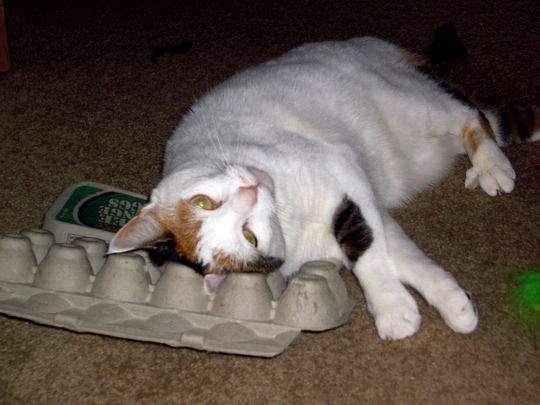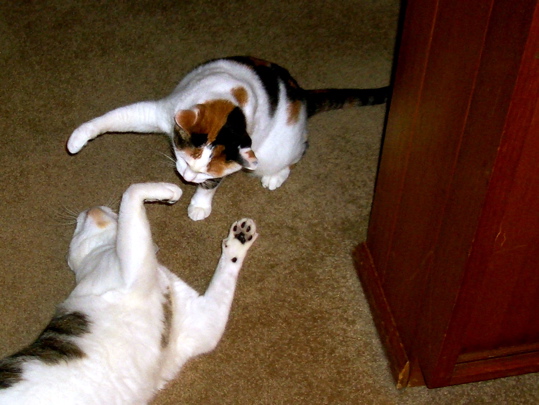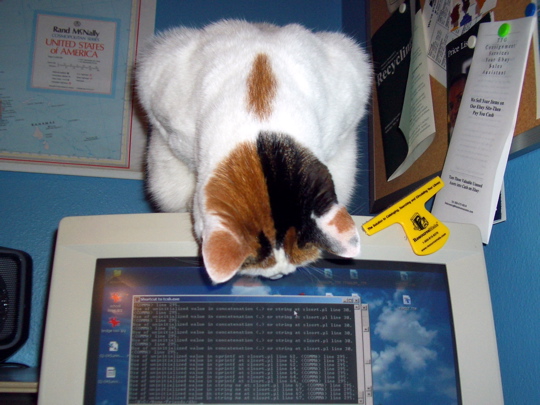November 29, 2005
Flying House's flying roof
A big gust of wind blew a third of our roof off last night! I stuck some pictures over on flickr. We didn't get too much water in the house thanks to Larry and Ann loaning us their car so we could run to Fred Meyer to buy a big honking tarp before they closed. And if that weren't enough heroism for friends and neighbors, they also helped us put it up in the 38-degree rain at 11pm and schlepped concrete blocks around to keep it from blowing away too.
November 24, 2005
Between the Strokes of Night by Charles Sheffield
 Nancy Kress wrote a trilogy (Beggars in Spain (1991), Beggars and Choosers (1994), Beggars Ride (1996)) about what happened when the need to sleep was genetically engineered out of the human genome. In her books, one of the side effects of sleeplessness was drastically extended lifespan.
Nancy Kress wrote a trilogy (Beggars in Spain (1991), Beggars and Choosers (1994), Beggars Ride (1996)) about what happened when the need to sleep was genetically engineered out of the human genome. In her books, one of the side effects of sleeplessness was drastically extended lifespan.
Sheffield's book, published in 1985, has sleep researchers discover a mode of human physiological function in which need for sleep is drastically reduced while lifespan is even more drastically increased.
It's so cool how effectively these SF tropes can be reused and reformed. Sheffield's book and Kress's trilogy really have very little in common except for the vague details outlined above.
First and foremost, Sheffield's mechanism is much less plausible. They find that by chilling the human body to near freezing (accompanied by some hand waving techie tech additional assistance), they reach a new slowed-down mode where they can operate in a way that seems normal to them but is slowed down 2000 times from "normal" function. I can think of a dozen reasons why this isn't very likely, but who cares.
What Sheffield does with the idea is to tell a story where interstellar travel with sub-lightspeed ships is plausible. You've got to choose your implausibility, you know?
He carves out an entertaining story exploring the implications of this change.
It's interesting that Ursula K. Le Guin wrote a story in her Changing Planes about a world where engineering away the need for sleep transformed the changed people into simple beasts with no trace of humanity. Was this a curmudgeonly commentary on the wishful thinking of Sheffield's and Kress's techno-utopian imagining?
Sunshine by Robin McKinley
 Both Becky and Rachel raved about this so it was a pretty good bet that it'd be good. Of course Robin McKinley wrote it so the odds are even better.
Both Becky and Rachel raved about this so it was a pretty good bet that it'd be good. Of course Robin McKinley wrote it so the odds are even better.
There are some books where half-way through the first chapter you know everything you need to know about the characters and the setting, and then there are the books that slowly unfold, revealing details as they become important to the story so that the world and characters come into progressively sharper focus as the book goes on. Sunshine is a book of the latter sort. And as such, it's very diifficult to write a spoiler-free review because almost anything I could tell you about it is a mystery as the book begins. I'm probably not spoiling too much by saying that it takes place in a world where vampires and werewolves and other demons and monsters are an accepted true part of life.
In such a setting there's a lot of information that has to be communicated to the reader so they know, for example, what sorts of demons there are. McKinley uses a clever device to make these info-dumps palatable: she puts them in the narrator's voice where the narrator, the Sunshine of the title, is a bit of an Other nerd, spending her spare time reading all about the Others. Her voice as someone who knows a little bit too much about her preferred subject is completely convincing and charming enough, in that way that true-geeks always are, that the info-dumps are virtually transparent within the larger narrative.
I don't want to say anything more about it because you should just go and read it for yourself. Go.
November 22, 2005
Serenity: the Official Visual Companion by Joss Whedon
 Okay, so I'm a shameless fanboy. This book consists of the shooting script for the movie Serenity packaged with an extended interview with Joss Whedon and some pre-production documents also written by Whedon. Oh and a whole bunch of pictures from the movie and the production process. It's probably exactly the same stuff that's going to show up as extras on the DVD when that comes out in a few weeks. But when I saw it in the book store my brain went "Shiny!" and handed over the bucks.
Okay, so I'm a shameless fanboy. This book consists of the shooting script for the movie Serenity packaged with an extended interview with Joss Whedon and some pre-production documents also written by Whedon. Oh and a whole bunch of pictures from the movie and the production process. It's probably exactly the same stuff that's going to show up as extras on the DVD when that comes out in a few weeks. But when I saw it in the book store my brain went "Shiny!" and handed over the bucks.
On first watching we were pretty disappointed in the movie. We were in the process of watching the series DVDs for the third or fourth time and so we were completely steeped in the characters and the worlds as they were in the show. They changed for the movie in subtle but important ways and to us it was just wrong. After we saw the movie a couple more times the new slant became more tolerable and we could accept the movie on its own terms.
Reading the script makes it clear that the changes were definitely engineered in by Whedon and weren't a strange byproduct of the production process. There is stuff in the script that was cut from the theatrical release too so we're hoping there will be some deleted scenes on the DVD. Inara in particular got cut pretty heavily.
The pre-production memos from Whedon trying to give the production crew a sense of the Firefly universe are fun to read for Joss's self-deprecating yet goofily pompous tone.
It's a nicely put together little book of fan goodies.
November 21, 2005
Sounds like chicken

You really need video to get the full effect here. Alice was rubbing her head back and forth and back and forth and back and forth on this egg carton.
I must apologize to all the cat blogging fans for this late posting. We got back on Saturday from a week in Ocean Shores, WA. If I sat in just the right spot in one room of our suite I could get a sketchy network connection, but it wasn't a very comfortable spot (and I'd already had to spend too much time in it getting all the comment spam deleted).
It was nice to get away for a bit. I spent more time reading books (as you'll see from the minor flood of reviews that will appear over the next few days) than I have in months. We watched some movies both on DVD (Blast From the Past (cute), Closer (completely unrelated form of cute)) and on the big screen (Zathura (don't bother!), Goblet of Fire (midnight show on Thursday) (quite good!)) (the local theatre was about 100 feet from our door). We walked on the beach (dodging cars since this is Washington), ate some good food, and slept. A good time, and I seem to have recharged my supply of parentheses.
November 20, 2005
Changing Planes by Ursula K. Le Guin
 The conceit of this book is that the period of loose-endedness one has while waiting in an airport for one's connecting flight, far from being boring wasted time, puts one in a position to (literally) visit other planes of existence. The book is made up of 16 short pieces describing different planes visited by the narrator through the auspices of the Interplanary Agency which mediates and facilitates travel between the various planes. Each entry is part travelogue and part fable, using the strange ways of living on these other worlds to examine the variety of ways in which thinking beings can relate to their environments and each other.
The conceit of this book is that the period of loose-endedness one has while waiting in an airport for one's connecting flight, far from being boring wasted time, puts one in a position to (literally) visit other planes of existence. The book is made up of 16 short pieces describing different planes visited by the narrator through the auspices of the Interplanary Agency which mediates and facilitates travel between the various planes. Each entry is part travelogue and part fable, using the strange ways of living on these other worlds to examine the variety of ways in which thinking beings can relate to their environments and each other.
I could reduce many of the planes to a brief description (the plane where no one speaks aloud, the warrior plane, the plane where never sleeping was a very bad idea), but condensing Le Guin is not a satisfying activity. She is an author who has more original thoughts before breakfast than I have in a week, and a facility with prose that is unmatched. I have a hard time being reasonable about Le Guin. She is a true master.
That said, I had a hard time getting through the book. I think I've had it out from the library for three months. This almost surely has more to do with my state of mind than any failings of the book. I did plow through the last third in a few hours on vacation last week. I was just flipping through the first couple of chapters before writing this entry, and I can't see what could have been holding me up, so probably just mood. If you're the sort of person who likes Le Guin, then this is the sort of thing you will like.
Anansi Boys by Neil Gaiman
 Fat Charlie Nancy discovers at his father's funeral that said father was Anansi, the trickster god in spider form. Fat Charlie also learns at the funeral that he has a brother, Spider, he has never known. Fat Charlie invites his brother for a visit and his life is never the same.
Fat Charlie Nancy discovers at his father's funeral that said father was Anansi, the trickster god in spider form. Fat Charlie also learns at the funeral that he has a brother, Spider, he has never known. Fat Charlie invites his brother for a visit and his life is never the same.
Fat Charlie is a pretty typical Gaiman protagonist, an everyman who's not prepared to find the supernatural becoming a part of his everyday life. So when Spider comes along and starts passing for Fat Charlie (first with his boss, and then with his fiance), Fat Charlie goes to some unthinkable lengths to get his life back.
The book is very light in tone. While some fairly awful things happen to some of the characters, they're not the sorts of things liable to give you nightmares. Fat Charlie and Spider are both likable in their own ways and concern for each of them keeps some level of suspense rolling even in the face of a story that seems assured of a happy ending from the beginning. Fun quick read.
November 11, 2005
November 06, 2005
Sale report
Well, the sale didn't attract a lot of people (of course it was in a house in the heart of a twisty subdivision in the wilds of Everett, and the weather was nasty all weekend), but seven glove pictures changed hands even so. All to friends, relations, and fellow artists, but still, that's pretty cool. Most were bartered for other works of art which is pretty nifty too.
I'm thinking about adding the ability to purchase prints of the glove pictures here on the web page. Anyone interested? I was asking $50 for a matted 8x10 at the sale and would probably stay within 20% of that. Too much? Too little? ;-) Be open to trading for cool stuff you make if you're cash-poor and/or stuff-rich.
Don't expect I'll be quitting my day job any time soon, but maybe I can start a new camera fund.


